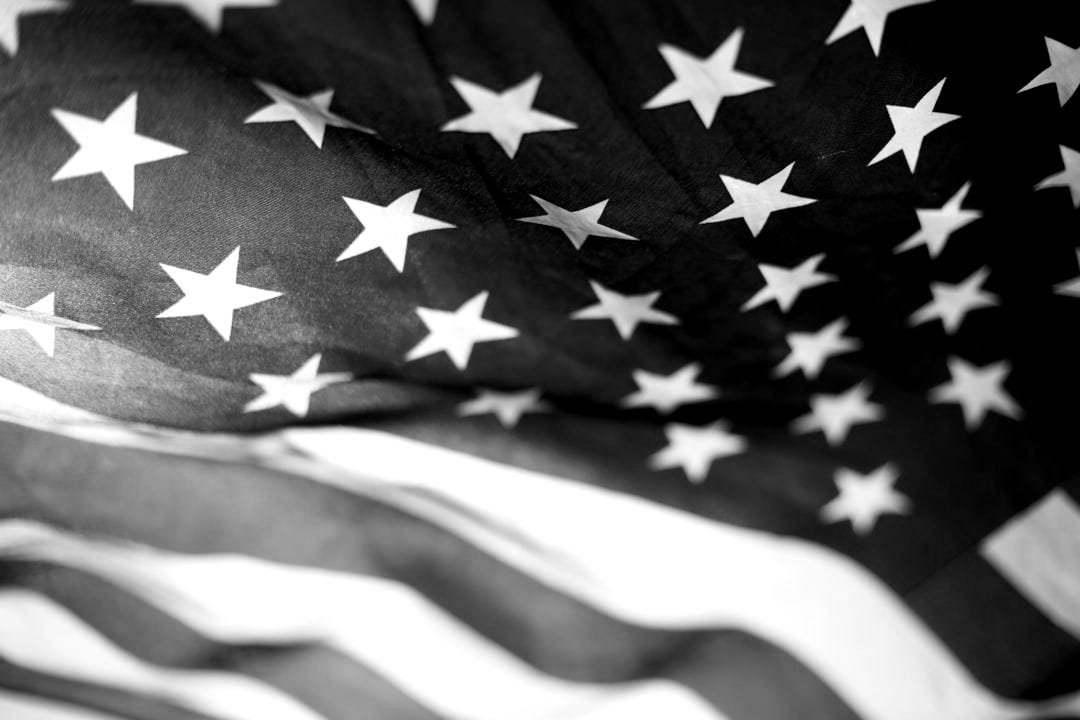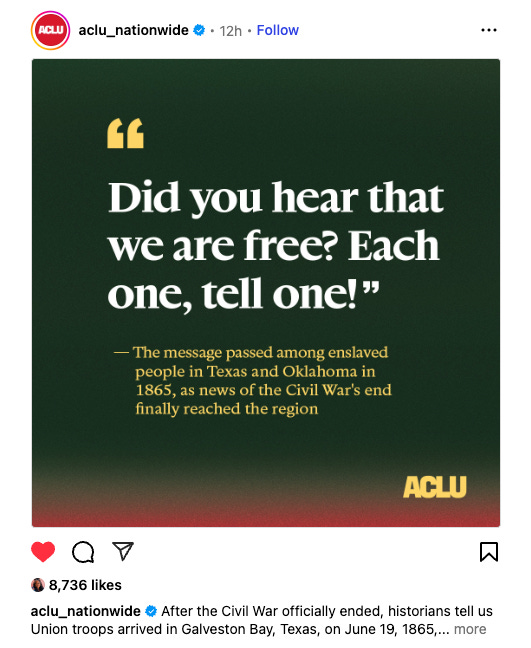If We Want to Be Free, We Need This
... and we need to start talking about it too
Yesterday was Juneteenth here in the United States — a day our nation celebrates freedom, in a way much different than the way we do on the 4th of July.
And it was a good day to be on Instagram.
I lost count of the inspiring/thoughtful/informative posts I saw.
A sampling….
Eight Freedom Lessons from Juneteenth
Friends, there are SO many wise lessons we can learn from Juneteenth — and, relatedly, from how our Black siblings practice their freedom:
Freedom is joyful, and freedom is actively practiced through joy.
Freedom is passed from person to person. We can give each other permission to be free, and we can take away others’ permission to be free.
The powers-that-be are usually more interested in limiting our freedom than making sure we know we have it.
Slavery was the law — and the norm — in our country for far longer than it has been outlawed. And even once the Civil War made it officially outlawed, enslavers in the state of Texas extracted nearly three more years of unpaid labor, before Union Troops arrived to enforce the law on June 19th, 1965. And even then, many citizens of the United States resisted the end of slavery. They created all kinds of new laws and norms to marginalize those who had been newly freed, so that they still couldn’t live fully free. Those times were full of segregation and Jim Crow laws — which continued to insist that free Black citizens of the United States be second-class citizens. That went on for another hundred years. And then, even when the Civil Rights Act was passed in 1964, a mere sixty years ago, the racism didn’t stop. Much of the racism in our country now is sub-conscious, nuanced, under-the-surface — and of course much of it is still quite explicit too. In other words, none of this is ancient history. At all. And thus, freedom is something we all must actively seek and consciously practice — still.
If something about our status, or the status of the world around us, is unacceptable to us, throwing up our hands and acting like we’re powerless is not an option. We need to actively work to change it. That is freedom.
The post from Martin Luther King, Jr.’s daughter, Bernice — where she quotes Dr. Allison Wiltz — says so much. I feel really weird putting this down in black-and-white writing, but yes, it’s true: Juneteenth is still considered “controversial” — and by extension, our Black siblings are reminded that their freedom is still considered controversial. Can you imagine?! Can you imagine celebrating July 4th as being controversial?
Many/most Americans think someone else’s freedom has nothing to do with them (see above), so why should they celebrate it? The American ideal of individualism, boot-strapping, becoming “self-made” is a helluva drug. Even if it’s a demonstrably hallucinogenic drug, people love it — and it’s wildly addictive.
In reality, none of us are free until everyone’s free (as our wise ancestor Fannie Lou Hamer taught us all), echoing spiritual teachings known since ancient times.
The Ones Who Walk Away from Omelas
I can’t set the stage for this profound story better than Wikipedia1 can:
The Ones Who Walk Away from Omelas is a 1973 short work of philosophical fiction by American writer Ursula K. Le Guin. With deliberately both vague and vivid descriptions, the narrator depicts a summer festival in the utopian city of Omelas, whose prosperity depends on the perpetual misery of a single child.
I first read this story when I was around twenty years old, in an intro-level Peace Studies course. And it has vividly stuck with me for more than twenty years.
There are so many times in my adult life that it has come to mind:
… like when seeing that we’ve accepted the reality of far-off people in another country being abused and grossly under-paid in order to make us cheap clothing…
… or that we’ve acquiesced to the prevailing reality in our large cities that whole sections of the urban core will be mired in poverty and lacking any real attention or investment — and that, most often, the people who will live in those areas are considered less valuable than the people who live in the “nice” areas…
… or that most of us have just gone about our regular daily lives while innocent children and families are starved to death, while being bombed and killed daily with weapons bought with our own tax dollars.
Our lives tell this story.
Or this story narrates our lives.
Or both.
Read the story to see what happens.
I highly recommend it.
Again: it has vividly stuck with me for decades.
How many stories can say that?!
True Freedom is Collective
America’s legacy as a country is that — while we like to talk about ourselves in superlatives like “most powerful” and “most wealthy” — we became wealthy from the free and forced labor of millions of African American people over our first 246 years.
What’s also true is that those peoples’ descendants still live here.
And what’s true on top of that is that almost all of the wealth, and value, and power created over those 246 years… was created by those ancestors… and yet, they never got to personally benefit… and neither have their descendants.

I’m well-versed in American culture.
I’m especially well-versed in White American culture.
And for my money, I can’t imagine a reality in which a White American family would stand for the fact that billions of dollars in wealth that their ancestors created…
… would have gone to someone else…
… and someone else’s descendants.
Why today’s African American families are still left to starve in a cold dark basement — the metaphorical equivalent of the child in Omelas — is beyond me.
I’m not delving into that question now.
But what I am doing is pointing out that another “freedom” holiday — the United States’ Independence Day, the 4th of July — is approaching, and so many Americans are still not free.
So I’m encouraging you, dear reader (since the vast majority of you are American), to consider what solidarity with your fellow Americans — especially your Black American siblings — might look like.
I’m asking you to consider who is still not truly free in our country.
I’m asking you to search your heart for ways that you are not yet free.
I’m asking you to reflect on the fact that — even if you don’t yet understand why or how — the only true freedom is collective.
And I’m asking you to talk about these things with other Americans.
Because if we want to be truly free, we need each other to also be truly free — all of us, each and every one of us.
And until that happens…
… we’re only cosplaying freedom here in America.
With Love,
Cecelia 💗
To celebrate For the Love of Humanity’s ONE-YEAR Birthiversary, I’ve decided to offer discounted Supporting Subscriptions this whole month, which you can access here:
Just click through the button above, and you can have a Supporting Subscription at a 24% discount, since this publication was born in ‘24.
Have you been thinking about becoming a Supporting Subscriber? Would you like more guidance and inspiration throughout every week? Would you like to participate in Community Coaching with us every month?
All of those things are available to you, as a Supporting Subscriber.
ALSO: in addition to all the extra love you’ll receive, you’ll be giving so much, too.
Yes, this is a labor of love for me, but it takes real time and energy to produce a publication like this — time and energy that will seriously increase, as I launch the podcast later this month.
Your financial support helps make all I spend to create this space seem worthwhile, since I know that 1) other people support and share this vision; 2) I am earning the very real dollars I need to earn with my work every day, in producing this labor of love.
If a Supporting Subscription is not financially possible for you right now, I get it! Times are tough right now.
You know what is also helpful?
When you share this with others!
And “like” posts!
And comment!
THANK YOU for giving what you can….
https://en.wikipedia.org/wiki/The_Ones_Who_Walk_Away_from_Omelas









ooh! So glad you plugged this again because I missed it the first time. So much to sit with over the weekend ahead. That story is an incredible one... it has stuck with me for decades too, and I tried to work it into my classes when I was still teaching English lit.